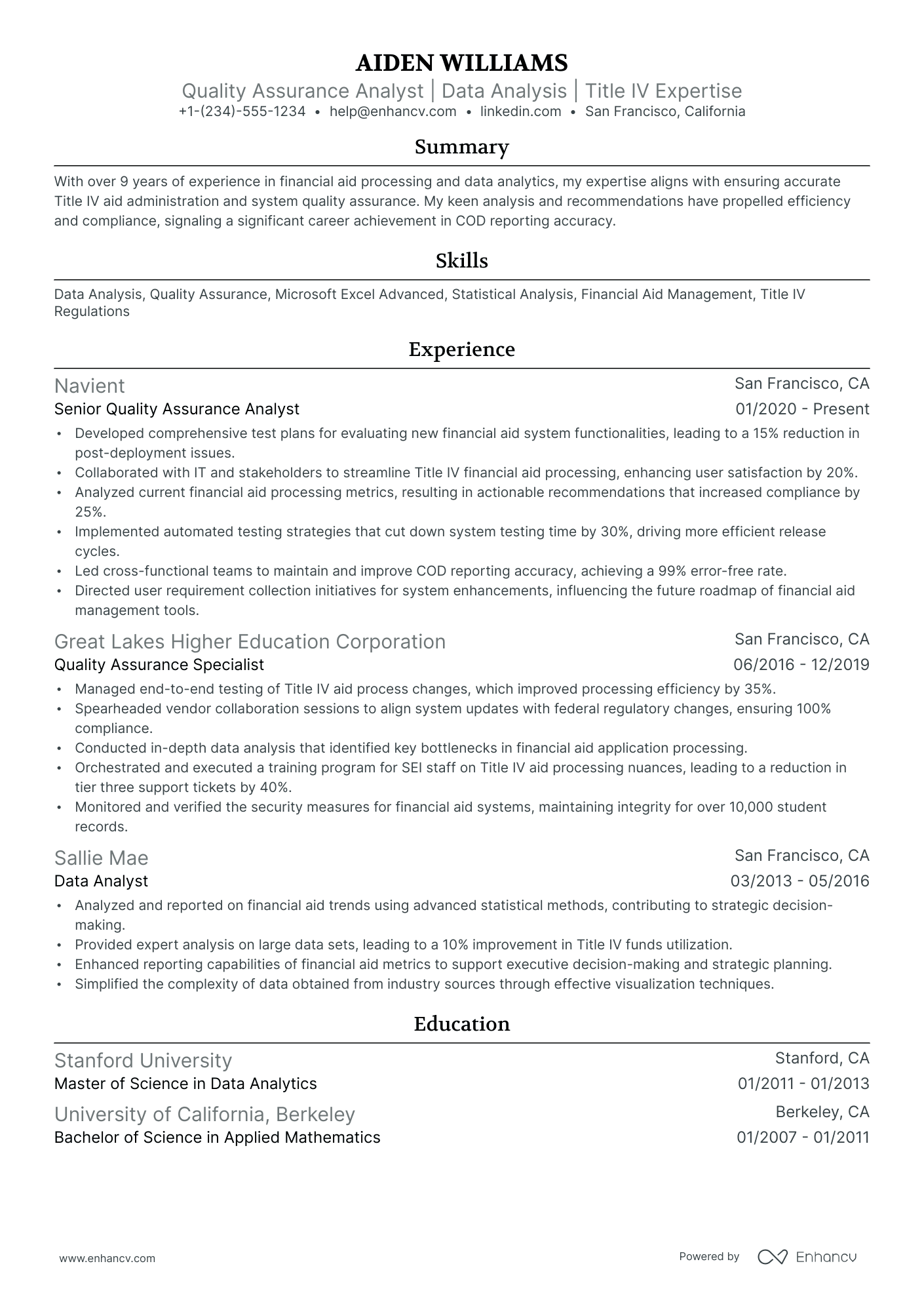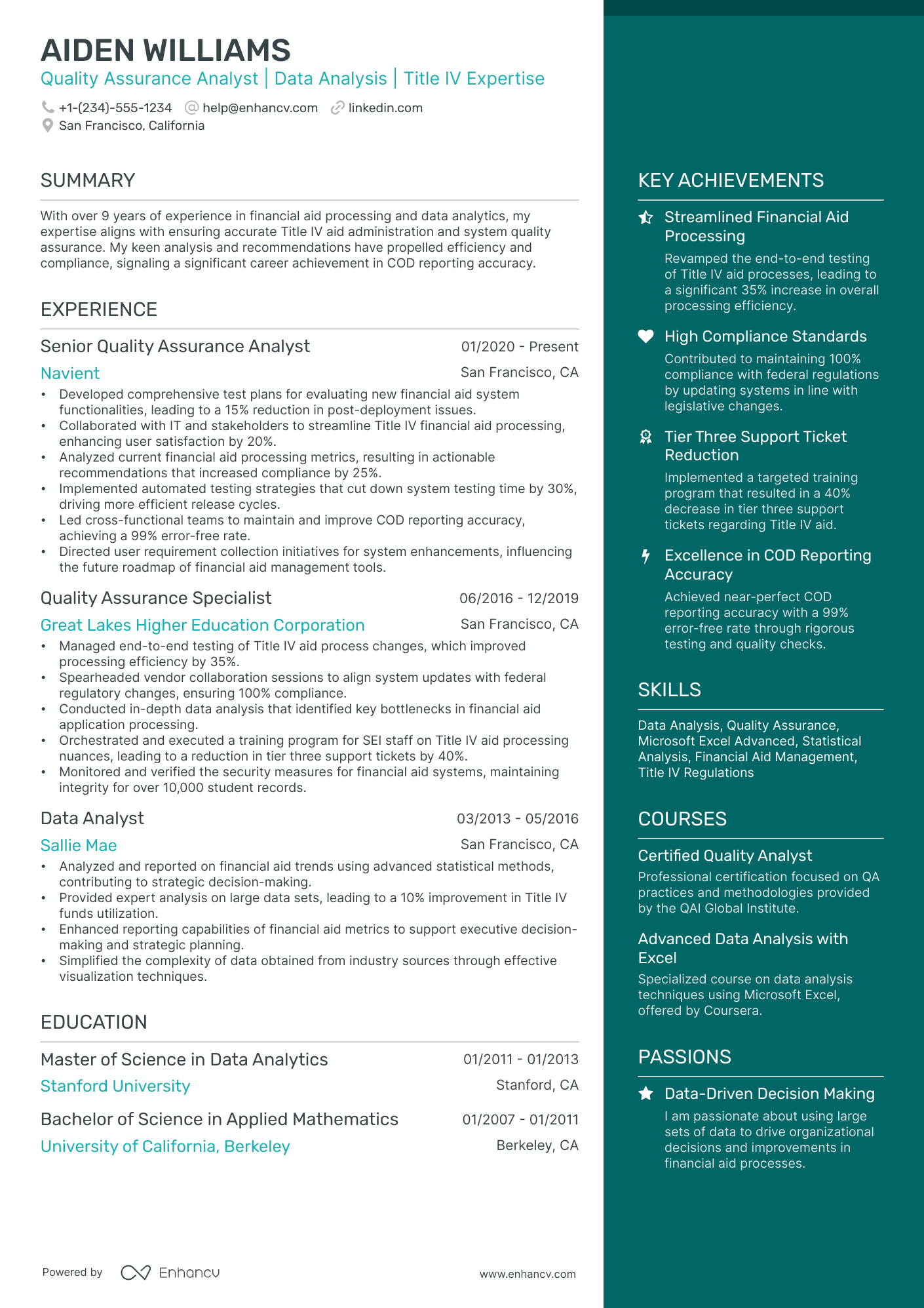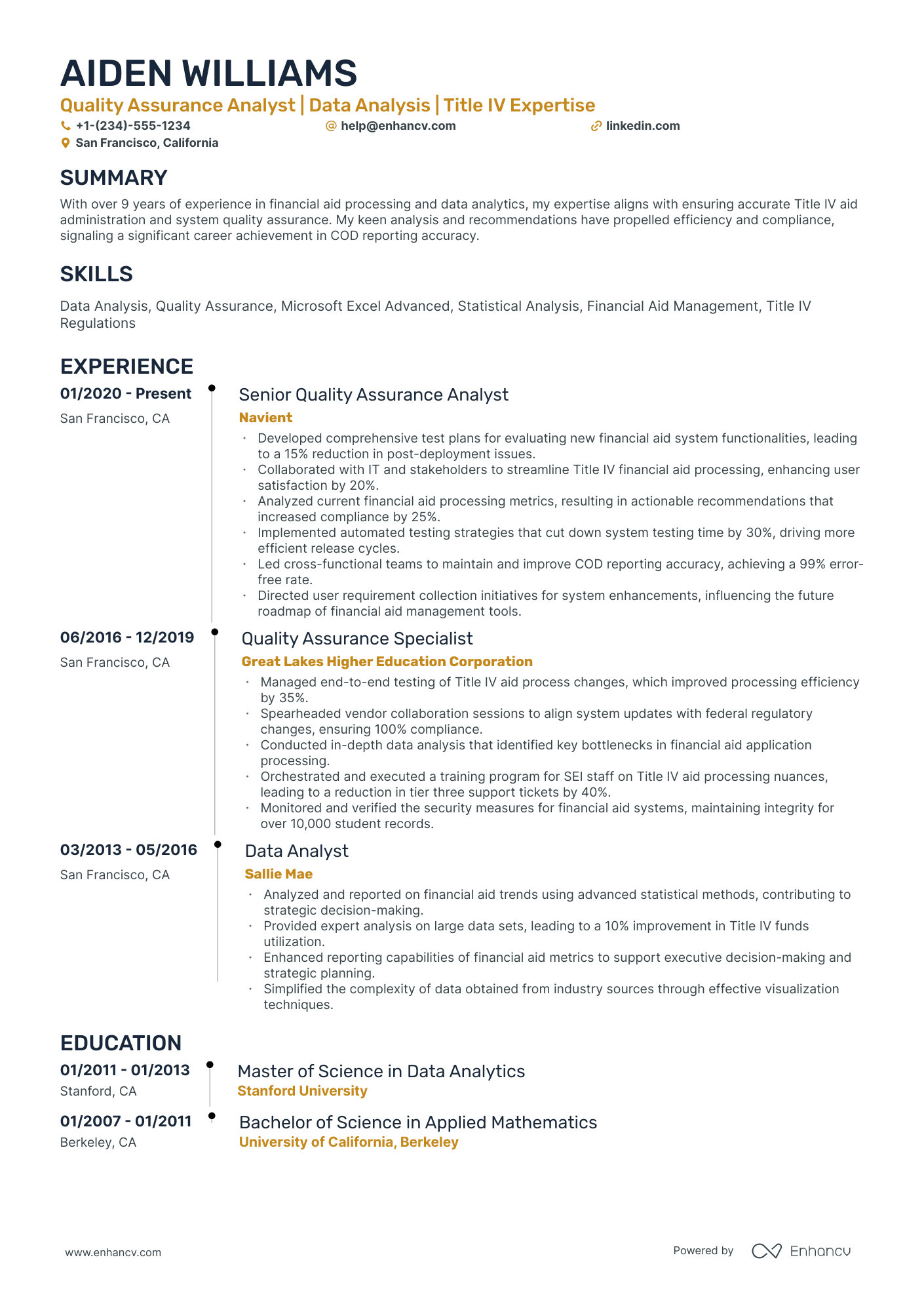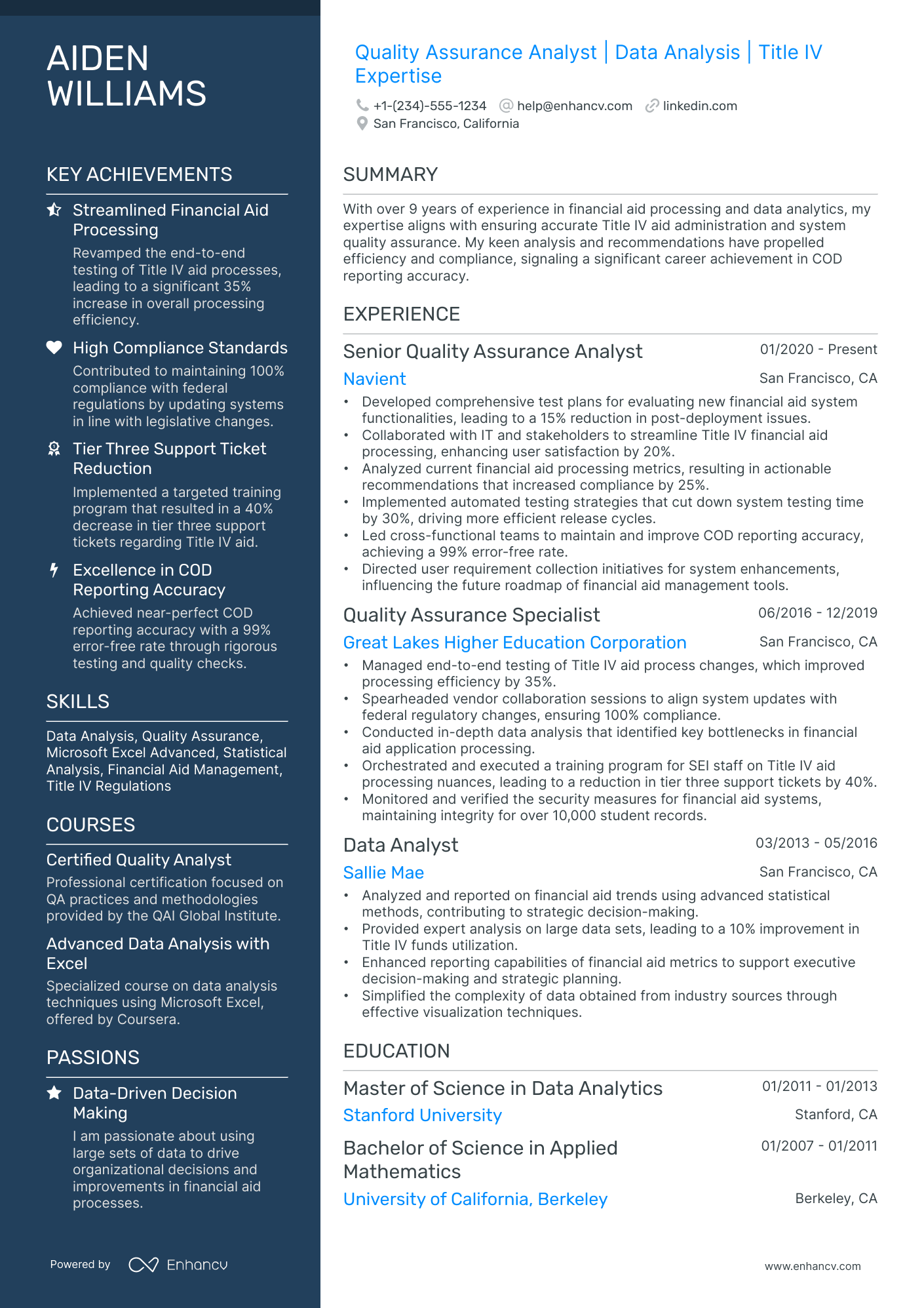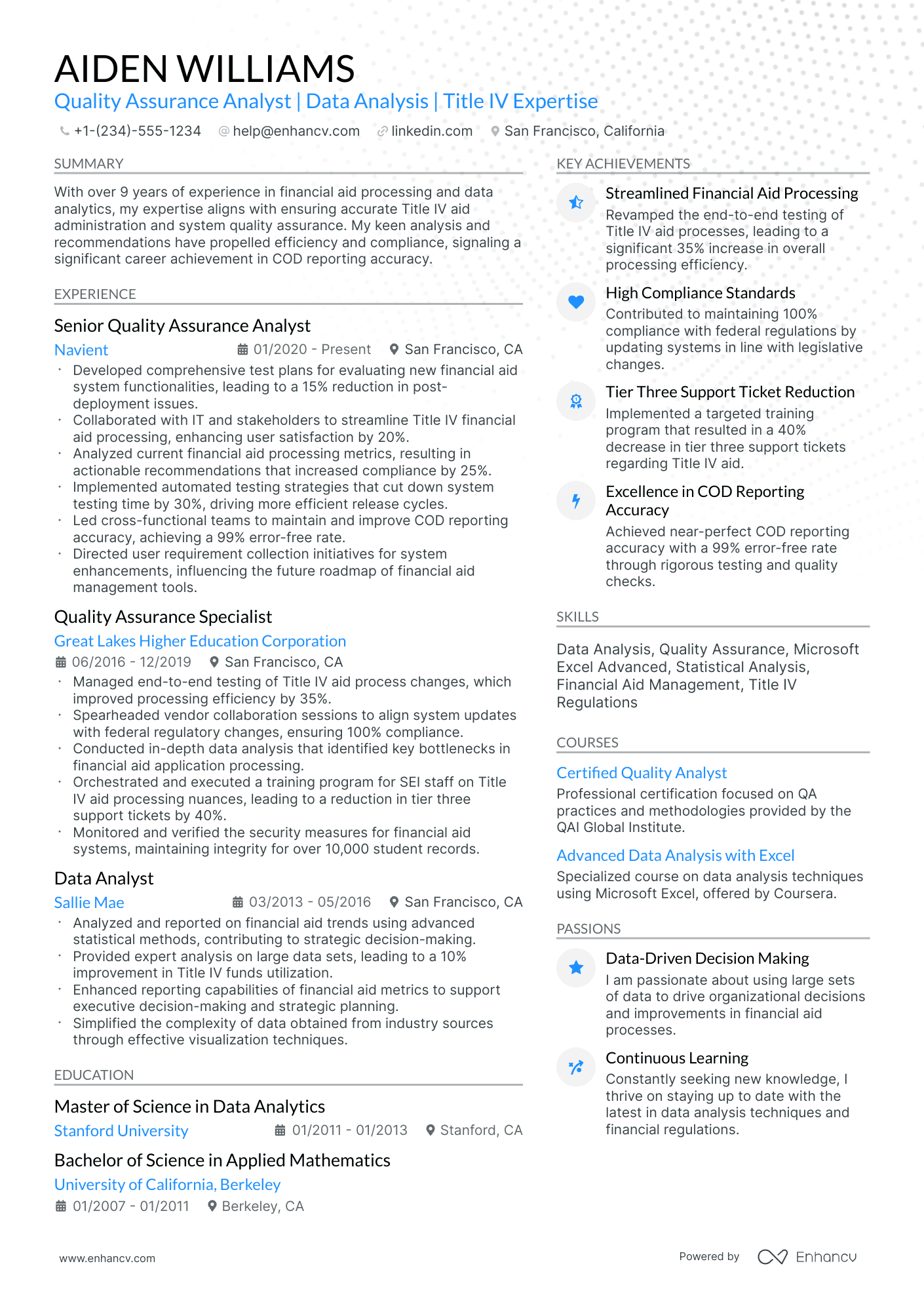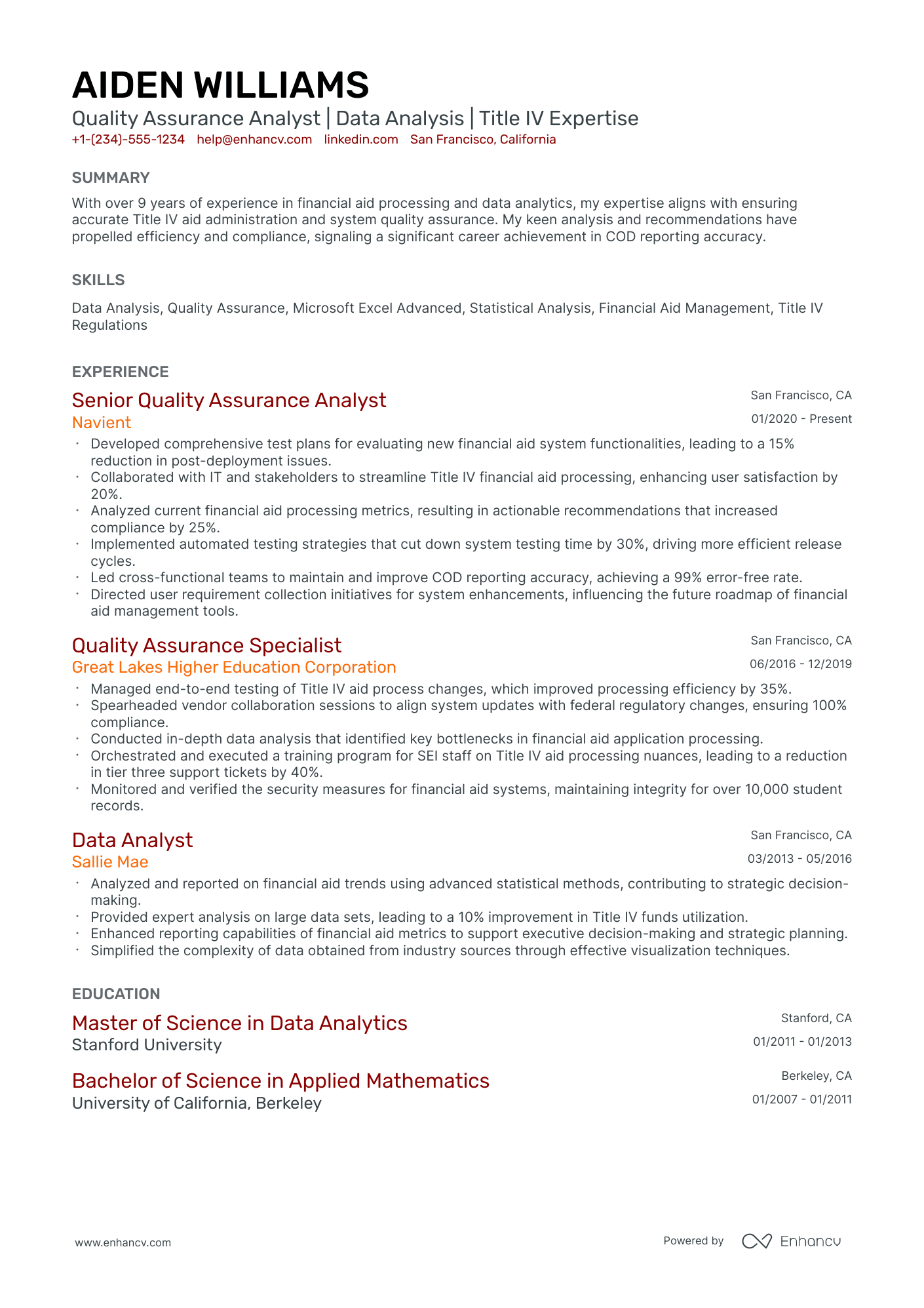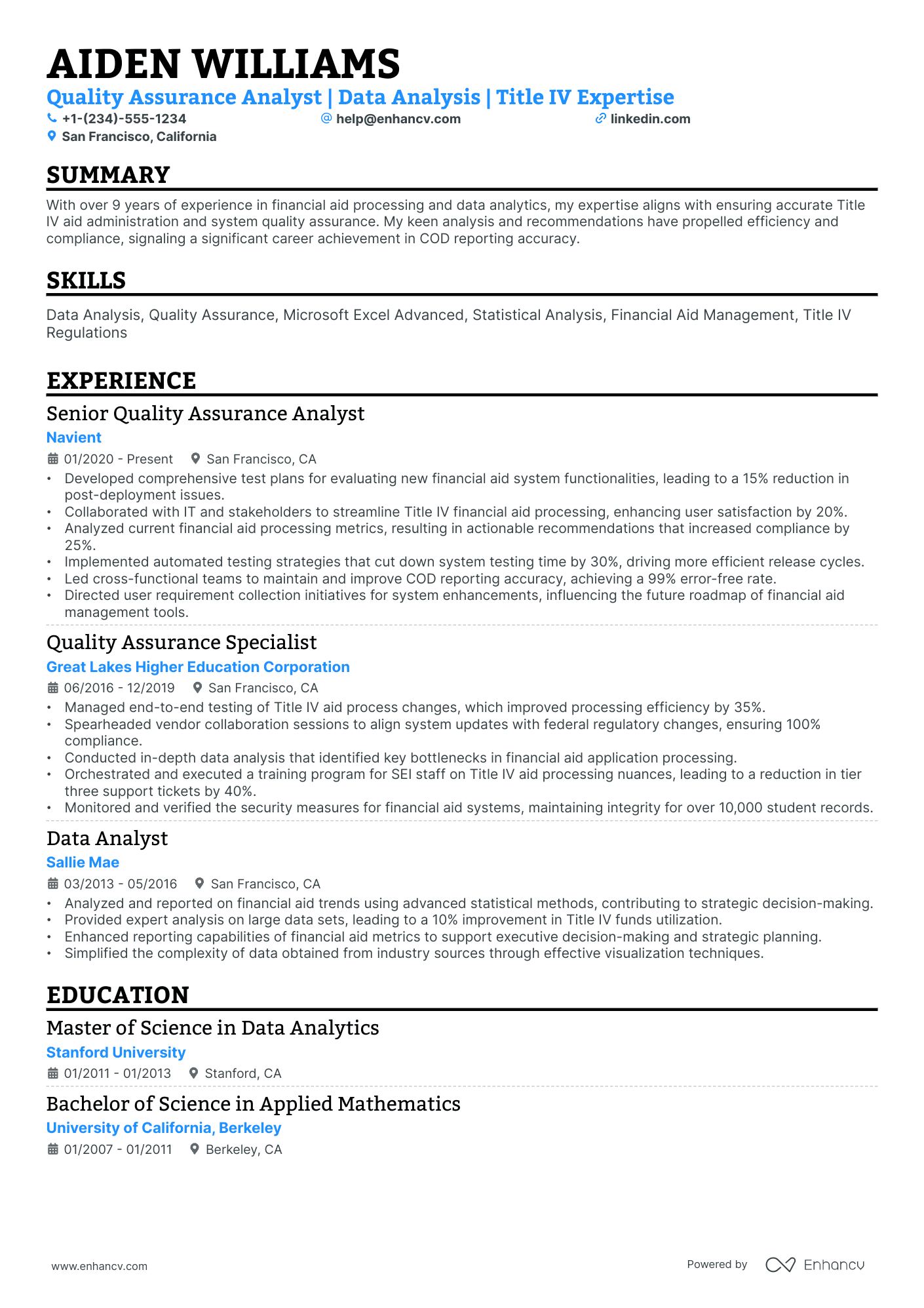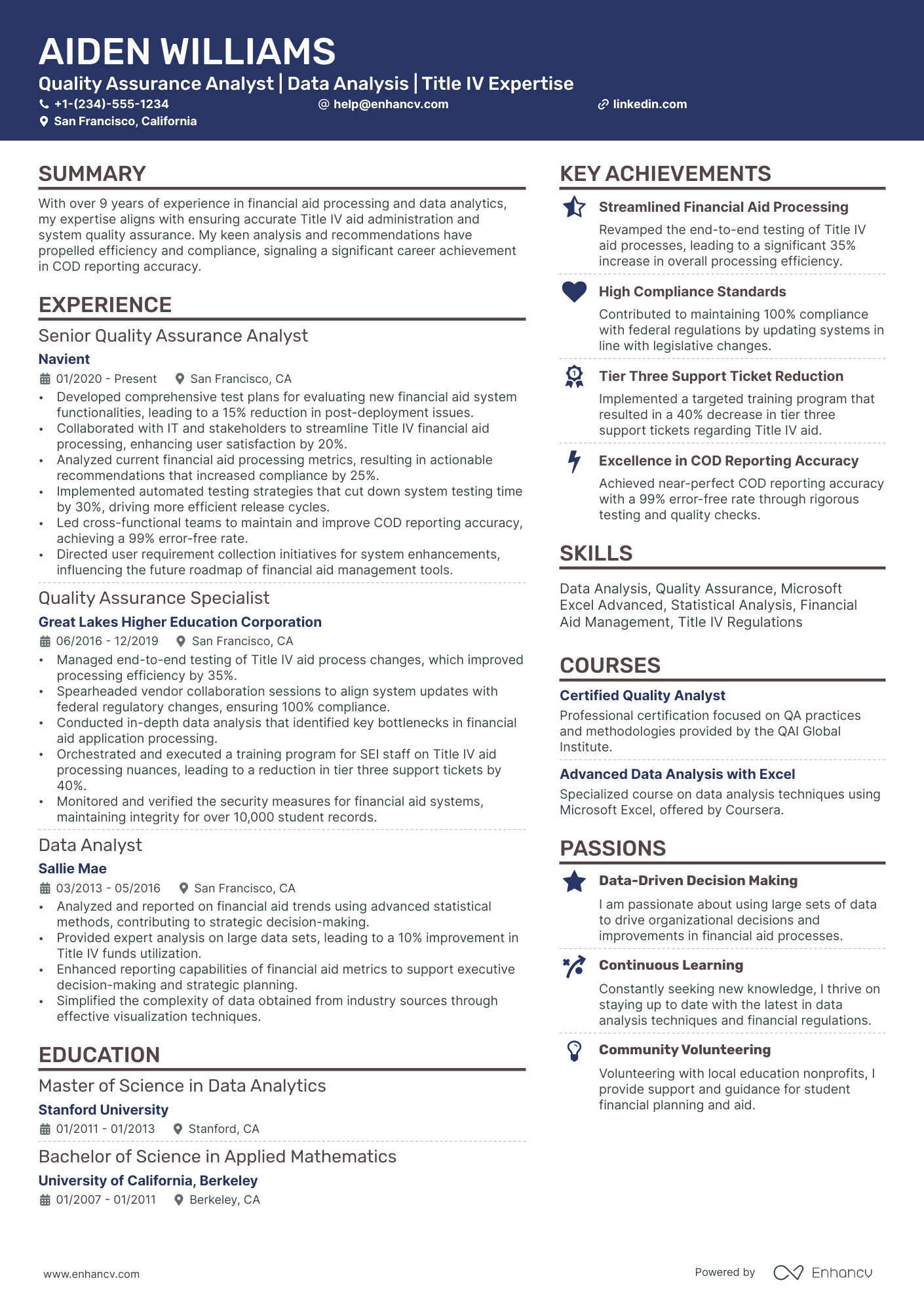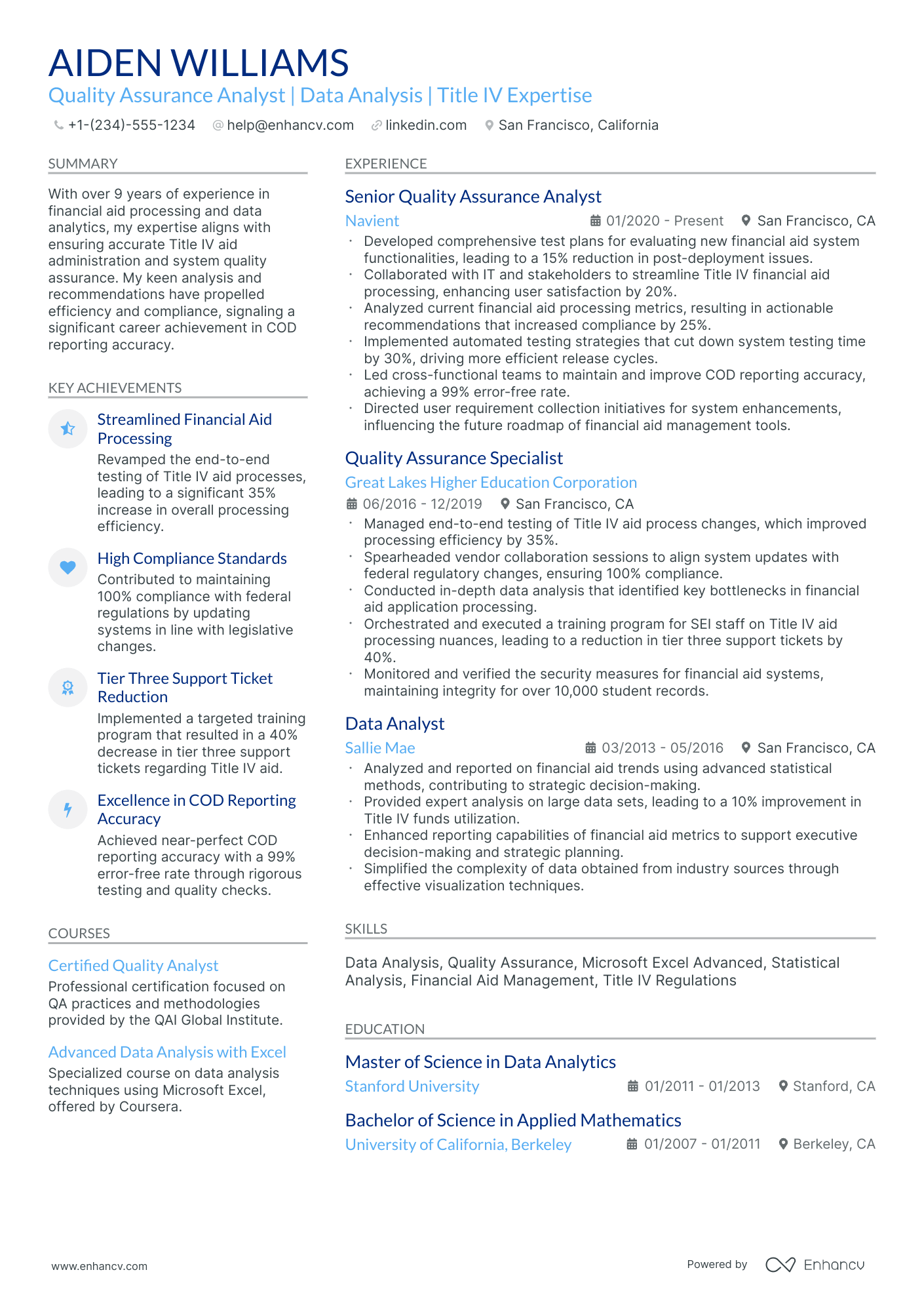As a quality assurance analyst, articulating the complex mix of technical skills, attention to detail, and critical thinking abilities in a concise resume can be a daunting challenge. Our guide is specifically tailored to help you frame your diverse expertise within clear, professional narratives, ensuring your resume stands out to potential employers.
- Defining the highlights of your quality assurance analyst career through your resume summary, objective, and experience.
- Real-world quality assurance analyst resume samples with best practices on how to stand out amongst the endless pile of candidate resumes.
- Most in-demand quality assurance analyst resume skills and certifications across the industry.
- Standardizing your resume layout, while maintaining your creativity and individuality.
If the quality assurance analyst resume isn't the right one for you, take a look at other related guides we have:
The importance of format and layout in your quality assurance analyst resume
Consider you're an HR professional at company X, evaluating two quality assurance analyst candidate resumes. John Smith presents a simple, traditional, and easy-to-read resume. Edward Price, however, uses a non-conventional, often illegible format. Whose resume would you spend more time on to understand their experience? This scenario underscores the importance of your quality assurance analyst resume’s design. It should be simply formatted and clearly communicate why you are the ideal candidate for the role.
Achieve this balance by:
- Listing your experience, beginning with the most recent and relevant, in reverse chronological order;
- Ensuring your header contains essential information, such as contact details, a headline, and a portfolio link. Include a professional photo in the quality assurance analyst resume header if you have one;
- Including only the most important and relevant resume sections to showcase your expertise and stand out from other candidates;
- Editing your quality assurance analyst resume to be no longer than two pages if you have extensive relevant experience. Use your limited resume space judiciously.
Also, remember that your quality assurance analyst resume might initially be scanned by an Applicant Tracker System (ATS).
When it comes to ATS:
- Opt for simple and legible fonts like Raleway, Rubik, Lato, etc., making your experience easy for the ATS to scan;
- Use serif and sans-serif fonts, both of which are ATS-friendly;
- Avoid overused options like Arial and Times New Roman, which, while suitable, may lack personality.
Contrary to a common myth, our recent study shows that the ATS can effectively process both one-column and two-column resumes. Learn more about this in the ATS myths guide.
Finally, when submitting your quality assurance analyst resume, always export it as a PDF to ensure all information remains intact, making the document easier to print, read, and scan.
Keep in mind market-specific formats – for example, a Canadian resume might follow a different structure.
Upload & Check Your Resume
Drop your resume here or choose a file. PDF & DOCX only. Max 2MB file size.
PRO TIP
If you failed to obtain one of the certificates, as listed in the requirements, but decide to include it on your resume, make sure to include a note somewhere that you have the "relevant training, but are planning to re-take the exams". Support this statement with the actual date you're planning to be re-examined. Always be honest on your resume.
Don't forget to include these six sections on your quality assurance analyst resume:
- Header and summary for your contact details and to highlight your alignment with the quality assurance analyst job you're applying for
- Experience section to get into specific technologies you're apt at using and personal skills to deliver successful results
- Skills section to further highlight how your profile matches the job requirements
- Education section to provide your academic background
- Achievements to mention any career highlights that may be impressive, or that you might have missed so far in other resume sections
What recruiters want to see on your resume:
- Demonstrated experience with different testing methodologies and processes such as Agile, Scrum, Waterfall, TDD (Test Driven Development), and BDD (Behavior Driven Development).
- Proficiency with QA tools and software testing suites, such as Selenium, JIRA, QTest, or TestRail, indicating the hands-on experience of the candidate with automated and manual testing tools.
- Knowledge of programming and scripting languages relevant to test automation, including but not limited to Java, Python, C#, or JavaScript.
- A strong understanding of quality metrics and performance indicators, along with experience in creating detailed, comprehensive, and well-structured test plans and test cases.
- Evidence of communication and collaboration skills, emphasizing experience with cross-functional teams and the ability to articulate technical issues to non-technical stakeholders.
Experts' advice on writing your quality assurance analyst resume experience
While the excitement and motivation for writing your quality assurance analyst resume was present in the first hour (or so), you now find yourself staring at the blank page.
The resume experience section is the one that allows you to make a memorable impression by matching job requirement with your past jobs and accomplishments.
To help you write this resume section, here are four mistakes you need to avoid:
- Listing every job you have had so far, including the irrelevant ones. Before that, consider each of your past roles based on relevancy to the role. It may be the case that the job you had 15 years ago may have taught you invaluable skills that are appropriate for the role;
- Including irrelevant work experience items. Those are past jobs that aren't linked with the role you're applying for (or so they seem). Consider how your past jobs will serve your professional presentation: will they be filling in a gap in your work history, or just taking up space?
- Focusing on responsibilities instead of accomplishments. Your quality assurance analyst resume shouldn't just be telling recruiters what you did in the past - as it's most often the case that candidates have had similar responsibilities. But, rather, the experience section should showcase the success you've attained in each past role, thanks to your unique skill set;
- Consider listing just your professional experience. Any role you've had in the past - e.g. volunteering, internships, etc. - can make it into your quality assurance analyst resume experience section. Make sure to include it alongside numbers and results.
Two more things you need to remember about your resume experience section.
The first are keywords. Or those specific job requirements that are crucial for the role . Ensure you've integrated them across your experience section to get sorted closer to the ideal candidate profile by the Applicant Tracker System (ATS).
The second are action verbs. Each of your experience bullets should start with a strong action verb, followed by your specific skill and your on the job achievements. Follow this formula to hint to recruiters what your unique value as a professional is.
Still with us? In the next section, we will show you how industry-leading professionals have avoided the four most common mistakes, while integrating keywords and action verbs in their experience section.
- Devised a comprehensive testing strategy for a newly developed SaaS product, increasing product stability by 40% over the testing period.
- Executed over 1500 automated and manual test cases, identifying and documenting 300+ defects, leading to a smoother product launch.
- Led a team of 5 QA testers in a high-paced development environment, enhancing overall team efficiency through the implementation of agile methodologies.
- Spearheaded the quality assurance process for mobile applications, ensuring a consistent and bug-free user experience across 20+ app updates.
- Collaborated closely with cross-functional teams to integrate user feedback into iterative testing, reducing user-reported issues by 55%.
- Optimized test coverage by incorporating exploratory testing techniques, which led to the early detection of critical usability pain points.
- Implemented a new automated testing framework using Selenium, which reduced the regression testing cycle time by 50%.
- Trained and mentored 4 junior QA analysts in the use of testing tools and best practices, enhancing the overall skill set of the department.
- Played a pivotal role in the successful migration of the client database, ensuring zero downtime and 100% data integrity.
- Formulated and executed a test plan for a major e-commerce platform update, preventing potential revenue loss of over $2 million.
- Performed thorough security vulnerability assessments resulting in the strengthening of data encryption measures and safeguarding customer information.
- Conducted multivariate testing to enhance website conversion rates by 18%, significantly boosting online sales.
- Established a Continuous Integration/Continuous Deployment pipeline, improving deployment frequency from once a fortnight to daily deployments.
- Directed user acceptance testing protocols for custom enterprise software, ensuring alignment with end-user requirements and operational standards.
- Negotiated with 3rd party vendors to incorporate specialized testing tools, enhancing the precision of load and performance testing procedures.
- Modernized legacy testing suites by introducing behavior-driven development testing methods, leading to improved test clarity and developer engagement.
- Conducted bilingual testing for the company’s CRM platform to ensure compatibility and localisation accuracy in English and Spanish markets.
- Facilitated productive defect management meetings with stakeholders, reducing defect resolution time by 30%.
- Initiated and led a targeted testing initiative to assess and improve a critical financial software's compliance with international regulations.
- Managed risk-based testing efforts that focused on high-risk areas of applications, conserving resources and prioritizing key functionalities.
- Developed custom testing metrics and dashboards to provide real-time insight into test progress and defect density for the software lifecycle.
- Led a team of 10 in the development of an automated API testing suite, resulting in a 35% increase in back-end testing efficiency.
- Interfaced with customer support teams to understand client issues, translating them into actionable test cases that decreased incident reports by 25%.
- Facilitated a cross-departmental initiative to align development and QA processes, culminating in a unified workflow that shortened the release cycle by 15%.
Quantifying impact on your resume
- Specify the percentage of product defects reduced due to your quality testing procedures.
- Include the number of test cases created, executed, and automated to demonstrate testing volume and efficiency.
- Detail the amount of time saved on testing cycles through process optimizations and test automation.
- Mention the percentage increase in test coverage achieved and its impact on product quality.
- Quantify the reduction in post-release bugs or customer complaints as a result of improved quality assurance practices.
- List any cost savings generated from identifying and resolving issues prior to product launch.
- Highlight the number of successful releases or projects supported by your quality assurance efforts.
- Detail the volume of data analyzed during testing to emphasize your capacity to handle large-scale testing scenarios.
Action verbs for your quality assurance analyst resume
What to do if you don't have any experience
It's quite often that candidates without relevant work experience apply for a more entry-level role - and they end up getting hired.
Candidate resumes without experience have these four elements in common:
- Instead of listing their experience in reverse-chronological format (starting with the latest), they've selected a functional-skill-based format. In that way, quality assurance analyst resumes become more focused on strengths and skills
- Transferrable skills - or ones obtained thanks to work and life experience - have become the core of the resume
- Within the objective, you'd find career achievements, the reason behind the application, and the unique value the candidate brings about to the specific role
- Candidate skills are selected to cover basic requirements, but also show any niche expertise.
Recommended reads:
PRO TIP
List your educational qualifications and certifications in reverse chronological order.
Balancing hard and soft skills in your quality assurance analyst resume
Recruiters indeed pay close attention to the specific hard and soft skills candidates possess. Hard skills refer to technical abilities or your proficiency in technologies, while soft skills are the personal attributes and qualities developed over your lifetime.
If you're unsure about effectively quantifying these skills on your resume, follow our step-by-step guide. It's crucial to first understand the key job requirements for the role. Doing so enables you to accurately list your:
- Hard skills in sections like skills, education, and certifications. Your technical expertise is straightforward to quantify. Most organizations find it sufficient to mention the certificates you've earned, along with your proficiency level.
- Soft skills within your experience, achievements, strengths, etc. Defining interpersonal communication traits in your resume can be challenging. Focus on showcasing the accomplishments you've achieved through these skills.
Remember, when tailoring your quality assurance analyst resume, ensure that the skills you list match exactly with those in the job requirements. For instance, if the job listing specifies "Microsoft Word," include this exact term rather than just "Word" or "MSO."
Top skills for your quality assurance analyst resume:
Selenium
JUnit
TestNG
Postman
JIRA
SQL
Python
Git
LoadRunner
API Testing
Attention to Detail
Analytical Thinking
Problem Solving
Communication
Time Management
Team Collaboration
Adaptability
Critical Thinking
Creativity
Conflict Resolution
PRO TIP
Showcase any ongoing or recent educational efforts to stay updated in your field.
The basics of your quality assurance analyst resume certifications and education sections
Improve the education and certification sections of your quality assurance analyst resume by:
- Dedicating more prominent space to certificates that are more recent and have helped you update your skill set
- Keeping all the information you list to the basics: certificate/degree name, institution, and graduation dates
- Writing supplementary information in the details of your certification or education section, only if you lack experience or want to show further skill alignment
- Including your credential or license number, only if the information is valid to your application or certification
Within quality assurance analyst job adverts, relevant education, and certification are always listed within the key prerequisite for the role.
Ensure you meet all job requirements with some of the leading certificates in the industry:
The top 5 certifications for your quality assurance analyst resume:
- Certified Software Quality Analyst (CSQA) - QAI Global Institute
- Certified Software Test Engineer (CSTE) - QAI Global Institute
- Certified Test Engineer (CTE) - International Institute for Software Testing (IIST)
- Certified Manager of Software Quality (CMSQ) - QAI Global Institute
- International Software Testing Qualifications Board Certified Tester (ISTQB-CT) - International Software Testing Qualifications Board
PRO TIP
The more time and effort you've put into obtaining the relevant certificate, the closer to the top it should be listed. This is especially important for more senior roles and if the company you're applying for is more forward-facing.
Recommended reads:
Which one to use: a resume summary or a resume objective?
The quality assurance analyst resume summary or objective serves as a good introduction to your experience for recruiters.
Have you ever wondered which one (the summary or objective) will be more appropriate for your quality assurance analyst resume?
- If you are a less experienced professional, write a resume objective statement. The objective is about three sentences long and provides recruiters with information about your career goals, strengths, and achievements . It should basically denote how you see yourself in this particular role, and what is your relevant experience and/or know-how;
- If you happen to have plenty of relevant experience, select your most impressive achievements for your resume summary. The summary is no longer than five sentences and serves as a storytelling instrument - highlighting your greatest career wins . Don't forget to align your summary with the job requirements to ensure your resume stays relevant to the role.
Read on for more information and examples of resume summaries and objectives from real world professionals.
Resume summaries for a quality assurance analyst job
- Dedicated quality assurance analyst with 7+ years of experience in the high-paced tech industry, adept at automated testing tools and methodologies. Boasts a track record of reducing defect rates by 25% at TechSolutions Inc. by implementing robust testing protocols and improving the team's agile practices.
- System Administrator turned Quality Assurance enthusiast, bringing over 10 years of IT infrastructure expertise into software testing. With a keen eye for detail and strong knowledge of SQL and Python, I successfully spearheaded the migration of server data validation processes at GlobalTech Corp, enhancing overall system reliability.
- Former Project Manager with a decade of experience in the construction industry who has successfully transitioned to Quality Assurance. Leveraging project management skills, a deep understanding of risk management, and a beginner’s proficiency in Java, aiming to ensure the highest software quality standards and improve user experience.
- With 5 years of rigorous experience in a consumer electronics environment, I bring a nuanced understanding of end-user requirements to the Quality Assurance sphere. Excelled at deploying timely quality control measures that resulted in 30% fewer customer complaints year-over-year for BestTech's flagship products.
- Eager to assimilate the values of a cutting-edge software development team as a burgeoning quality assurance analyst. Although new to the field, I am committed to mastering test automation and possess a foundational knowledge of C# and Agile workflows, aiming to contribute significantly to product excellence and customer satisfaction.
- Aspiring quality assurance analyst equipped with a Bachelor's in Computer Science and comprehensive coursework in software development life cycle and testing principles. Despite lacking direct industry experience, I am passionate about delivering flawless user experiences and continuously engaging in professional development to master the latest QA tools and practices.
Optimize your resume summary and objective for ATS
Drop your resume here or choose a file.
PDF & DOCX only. Max 2MB file size.
Other relevant sections for your quality assurance analyst resume
Apart from the standard quality assurance analyst resume sections listed in this guide, you have the opportunity to get creative with building your profile. Select additional resume sections that you deem align with the role, department, or company culture. Good choices for your quality assurance analyst resume include:
- Language skills - always ensure that you have qualified each language you speak according to relevant frameworks;
- Hobbies - you could share more about your favorite books, how you spend your time, etc. ;
- Volunteering - to highlight the causes you care about;
- Awards - for your most prominent quality assurance analyst professional accolades and achievements.
Make sure that these sections don't take too much away from your experience, but instead build up your quality assurance analyst professional profile.
Key takeaways
We trust that this Enhancv guide has been informative and useful. To summarize the essential points:
- Opt for a simple and readable format, focusing more on your quality assurance analyst achievements rather than just duties;
- Emphasize your accomplishments in the quality assurance analyst experience section over mere responsibilities;
- If lacking relevant experience, utilize various resume sections like education and volunteering to demonstrate your suitable skill set;
- Never overlook the significance of pertinent higher education, training, and certifications;
- Incorporate diverse sections in your resume to highlight not just your skills expertise but also your personality.
